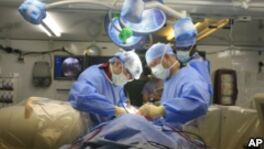正文
VOA慢速英语:New Treatment Helps Reduce Pain From Spinal Cord Injury
From VOA Learning English, this is the Health & Lifestyle report.
When Jon Forbes lost his ability to walk, he had to make serious changes but went on with his life.
Forbes suffered a spinal cord injury 14 years ago. It forced him use a wheelchair to move around. But Forbes says it was not his paralysis but something else that nearly broke his will to live.
It was electric shocks of pain in areas of his body that were paralyzed.

"It was horrible. Excruciating. And it never stopped. You wake up, it's there. All day, it's there. You go to bed, it's there."
His spinal cord injury is midway down his chest. So, Forbes can use his arms and hands. Yet he is unable to move his hips or legs.
Forbes does feel sharp pain like electric shocks below his spinal injury. He needed to stop the pain, but nothing seemed to work.
The World Health Organization reports that about 25 million people worldwide live with a spinal cord injury. The injuries are well-known for causing paralysis.
Another common side-effect is neuropathic pain, a sensation Forbes describes. Neuropathic pain creates feelings of electric shocks in parts of the body that no longer experience normal sensations.
In about 10 percent of cases, this feeling can be so severe and relentless, victims consider suicide.
Jon Forbes did.
"I had tried pretty much every kind of drug, tried exercise, tried … you name it. Anything and everything to try and get this pain to stop. And it wouldn’t. And I was working at an investment bank and decided this was it. Quit my job, and decided, this was going to be the end. I just couldn't take it."
But then, he learned about a doctor in Colorado who uses spinal operations to stop "suicidal pain."
Scott Falci is the chief neurosurgical adviser at Craig Hospital in the city of Denver. Craig Hospital specializes in helping spinal cord injury patients. Falci has helped hundreds of paralyzed patients who suffer from severe neuropathic pain.
For those with a spinal cord injury, traditional treatments for reducing pain often fail. This failure leads some doctors to suggest the pain is "in their head."
“Patients – when they ultimately come to me – I’m (kind of) their last resort. Unfortunately many of our patients are told that this could be a psychiatric problem.”
But, Falci says, it is mainly a spinal cord problem. And he fixes it with surgery.
Falci and his surgical team work for hours just to expose the spinal cord. Then he seeks out shiny, white "root entry zones." These zones, about the size of a button or coin, are filled with thousands of cells. This is where nerves bring sensations from the body and root into the spinal cord.
"These nerve cells that come from different parts of the body don't travel all the way up to the brain. They connect first with other nerve cells in the spinal cord and let them communicate signals to the brain."
Using a pin-sized instrument, Falci inspects the electric signals produced by these nerve cells. Mostly, he finds a calm electric signal. But when he finds a hyperactive nerve cell, he knows he has found the problem area.
"Hyperactive nerve cells – yeah, we call them ‘hot spots’ -- (are) firing with high energy when they shouldn't be firing."
Falci says hot spots can cause suicidal pain. There can be hundreds of them. He finds the hot spots below the injury and kills them with heat.
He says nerve signals coming in from the body can go around a spinal cord injury. He likens this to cars turning off a main road to avoid an accident. The drivers travel on local streets to go around the accident before returning to the highway.
When hyperactive nerve signals create a detour in the body, Falci says, they carry false pain signals. So, by killing hot spots below the injury, he removes more pain.
Falci says this can be life-changing.
It was for Jon Forbes, who had this surgery two years ago. Just two months after the operation, Forbes began a new job — as the deputy treasurer for Colorado.
"I'm a pretty happy person these days. I'm not 100% without pain, but I can live, and I want to live, which is … thank God for saving my life, Dr. Falci, you know."
Falci plans to publish new research that maps this "detouring" nervous system.
I’m Anna Matteo.
Shelley Schlender reported this story for VOA News from Denver, Colorado. Anna Matteo adapted it for Learning English. George Grow was the editor.
Try this listening quiz to check your understanding.
相关文章
- Scientists Record Largest ‘Marsquakes’ on the Red Planet
- App Helps People Collect Animals Killed on Roads
- 多林戈英语测试获得支持 但问题依然存在
- 创造英语沉浸体验
- It's OK to 'Take a Page from Someone Else's Book'
- 卢旺达的美国英语学习者成为麻省理工学院教授
- 感恩节与英语语法
- Companies Expand Plans for Removing Carbon Dioxide From Air
- 疫情期间 学习英语的学生经历了一段困难时期
- Volcanic Activity on Spanish Island Keeps Many Away from Homes




 手机网站
手机网站